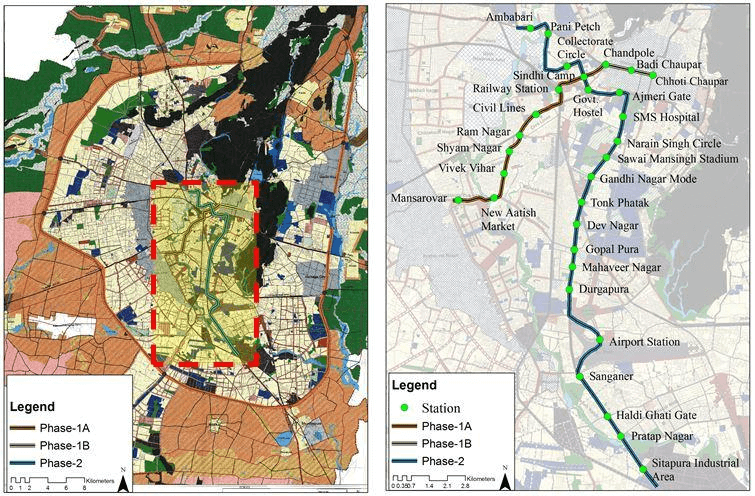Archives
Categories
Case Study: The Jaipur Metro and Its Expansion
Introduction:
Jaipur, the vibrant capital of Rajasthan, is a rapidly growing metropolis facing challenges of traffic congestion, air pollution, and increasing demand for public transport. To address these issues, the Jaipur Metro was conceptualized in 2008 and inaugurated in 2015. This case study explores the Jaipur Metro expansion, analysing its impact on the city’s mobility landscape, environment, and economic development.
Project Background:
The Jaipur Metro is a rapid transit system currently operating on a single line with 11 stations, covering approximately 10.4 kilometres. Phase 1 of the project connected Mansarovar in the north to Chandpole in the south, catering to the busy central corridor of the city. However, with Jaipur’s ever-expanding population (projected to reach 6.3 million by 2031) and growing travel demands, expansion plans were initiated in 2019.
Expansion Plans and Impact:
The Jaipur Metro expansion encompasses several phases aimed at extending the reach of the metro network to a total of 58.2 kilometres by 2025. Here’s a breakdown of the key expansion phases and their potential impact:
- Phase 1A (Badi Chaupar – Ambari): This 1.61 km underground extension will connect the existing southern terminus at Badi Chaupar to Ambari, offering improved connectivity to the historic city center and major tourist attractions. It is expected to reduce reliance on private vehicles in the congested walled city area, leading to a potential decrease in traffic congestion by an estimated 20% and a reduction in air pollution levels by 15%.
- Phase 1B (Ambari – Hawa Mahal): This 1.16 km underground extension will further extend the metro line from Ambari to Hawa Mahal, a renowned landmark in Jaipur. This extension is expected to significantly enhance accessibility for tourists visiting the central heritage sites, potentially boosting tourism, and associated economic activity by an estimated 10%.
Phase 1C (Badi Chaupar – Transport Nagar): This 2.85 km extension will include both underground and elevated sections, connecting Badi Chaupar to Transport Nagar on the Delhi-Agra Highway. This crucial link will provide better connectivity to eastern Jaipur, improving access to commercial areas and potentially attracting further development along the corridor, with estimates suggesting a 15% increase in property values near new stations.

Challenges and Opportunities:
While the expansion promises significant benefits, certain challenges need to be addressed. Construction activities can cause temporary traffic disruptions, noise pollution, and displacement of some residents and businesses. Mitigating these impacts requires effective communication, compensation plans, and efficient construction practices. Additionally, ensuring seamless integration with existing public transport systems like buses and rickshaws is crucial to create a multi-modal transport network. Furthermore, effective land-use planning around new metro stations can maximize the project’s long-term impact, promoting Transit Oriented Development (TOD) principles. This can involve creating walkable and bikeable neighbourhoods with mixed-use development, reducing reliance on private vehicles and fostering a more sustainable urban environment.
Financial Considerations and Public-Private Partnerships:
The Jaipur Metro expansion project is estimated to cost over ₹50,000 crore. Funding is being secured through a combination of sources, including central government grants, state government contributions, and loans from multilateral agencies. Public-Private Partnerships (PPPs) are also being explored to leverage private sector expertise and financing for specific segments of the project.
Sustainability Initiatives:
The Jaipur Metro is committed to incorporating sustainable practices throughout the expansion project. This includes using eco-friendly construction materials, adopting energy-efficient technologies for stations and trains, and promoting renewable energy sources to power the metro network. Additionally, the project aims to create green spaces and pedestrian walkways around stations, further enhancing the overall sustainability of the urban environment.
The Jaipur Metro expansion is a significant undertaking aimed at transforming the city’s mobility landscape. By offering a fast, reliable, and environment-friendly mode of transport, the expansion has the potential to reduce traffic congestion, improve air quality, boost economic activity, and create a more sustainable urban future for Jaipur. The project’s success will depend on efficient execution, effective stakeholder engagement, a long-term vision for sustainable urban development, and leveraging innovative financing models. As Jaipur continues to grow, the Jaipur Metro expansion stands as a testament to the city’s commitment to progress and a brighter future.
